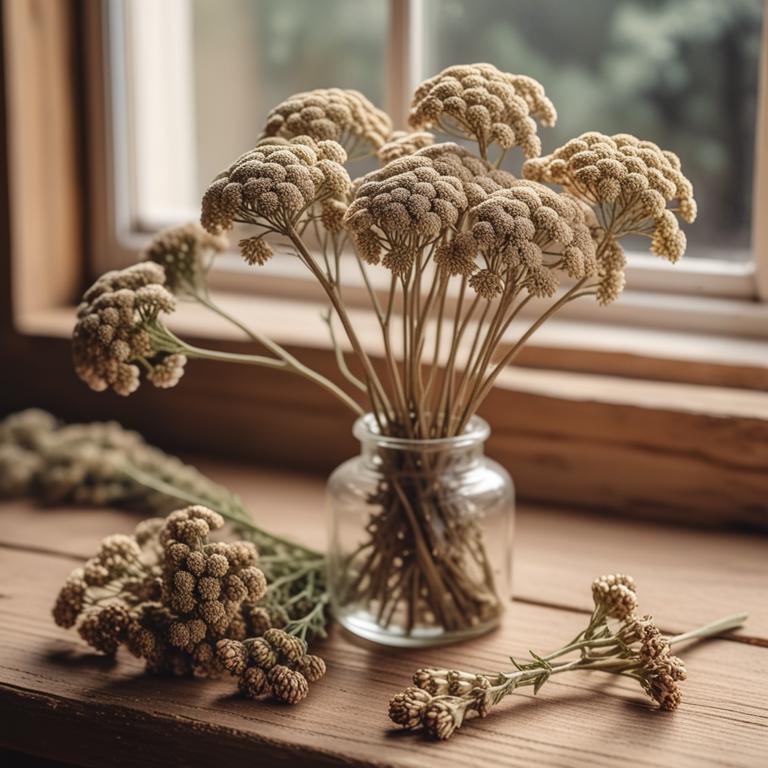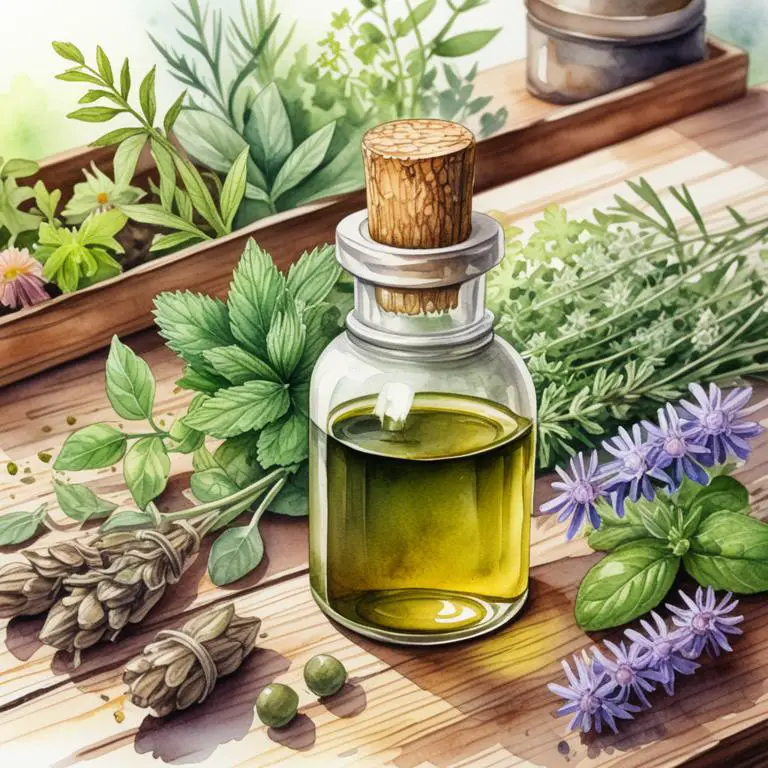Updated: Dec 1, 2024
Herbal Remedies for Swollen Feet: Causes and Effective Treatments

Swollen feet can be a real nuisance, making it hard to walk, stand, or even sleep.
When fluid builds up in your feet, they can feel heavy, painful, and look puffy. This can make everyday activities a challenge, especially if you have to be on your feet all day. Swollen feet can be caused by a variety of things, such as standing or walking for long periods, eating too much salt or sugar, or having a medical condition like kidney or heart disease. Herbal remedies can help reduce swelling and discomfort in your feet. Herbs like dandelion root, juniper berries, and celery seeds have natural diuretic properties that can help your body get rid of excess fluids.
These herbs can also help lower blood pressure and improve circulation, which can contribute to swelling. To use these herbs, you can make teas by steeping the roots or seeds in hot water. You can also add them to a warm bath or use them as a compress to apply directly to your feet. Some people also use herbs like ginger and cayenne pepper to reduce inflammation and ease pain in their swollen feet. These herbs can be added to your tea or taken as a supplement.
Another option is to try a foot soak with herbs like peppermint and chamomile, which can help relax your feet and reduce swelling.
Table of Contents
What are the causes of swollen feet condition?
The main causes of swollen feet are several medical conditions and factors that can lead to fluid buildup and swelling in the feet and ankles.
One of the most common causes is Varicose Veins, a condition where the veins in the legs become enlarged and twisted, causing blood to pool and leading to swelling. Edema, also known as water retention, is another cause of swollen feet, where the body retains too much fluid, causing the feet and ankles to swell.
Diabetes is a major cause of swollen feet, as high blood sugar levels can damage the nerves and blood vessels in the feet, making it harder for the body to pump blood and causing fluid buildup. Kidney Failure occurs when the kidneys are no longer able to filter waste and excess fluids from the blood, leading to fluid buildup in the feet and ankles. Similarly, Kidney Disease, such as nephrotic syndrome, can cause the kidneys to produce excess protein in the urine, leading to fluid buildup in the feet and ankles.
Heart Failure is another cause of swollen feet, as the heart is unable to pump enough blood to the rest of the body, leading to fluid buildup in the feet and ankles, particularly in the evening.
What are the advantages of using herbs to cure swollen feet?
Using herbs for swollen feet can bring relief from the discomfort and pain.
One of the main benefits is that they can reduce inflammation and swelling, making it easier to walk and move around. These herbs often have anti-inflammatory properties that help to calm down the skin and tissues, reducing redness and swelling. They can also improve circulation, which helps to flush out excess fluids and reduce swelling.
Some herbs may also have antiseptic properties, which can help to prevent infection and promote healing. Additionally, they can help to relax the muscles and ease any pain or stiffness associated with swollen feet. This can be especially helpful after a long day of standing or engaging in physical activity.
By incorporating these herbs into your routine, you can experience relief from swollen feet and get back to your normal activities with ease.
What are the key herbal remedies for swollen feet?

Herbs can be a great help when you have swollen feet.
One of them is Achillea millefolium, also known as yarrow. It has anti-inflammatory properties that can reduce swelling and ease pain. Yarrow also has antiseptic properties, which can prevent infections from forming in the affected area. Glycyrrhiza glabra, or licorice root, can also be beneficial for swollen feet. It has anti-inflammatory properties and can help reduce swelling by improving blood circulation. Licorice root can also help reduce pain and discomfort caused by swelling. Aloe barbadensis, or aloe vera, is another herb that can help with swollen feet. It has anti-inflammatory and soothing properties that can reduce redness and swelling.
Aloe vera can also help repair damaged skin and promote healing. Curcuma longa, or turmeric, is a spice that has anti-inflammatory properties. It can help reduce swelling and pain by blocking the production of inflammatory chemicals in the body. Turmeric can also improve blood circulation, which can help reduce swelling. Hamamelis virginiana, or witch hazel, is a herb that can help with swollen feet. It has anti-inflammatory and antiseptic properties that can reduce swelling and prevent infections. Witch hazel can also help improve circulation and reduce pain and discomfort. These herbs can be used in various ways to help with swollen feet. They can be applied topically in the form of creams or ointments, or consumed as teas or supplements.
It's always a good idea to talk to a doctor or healthcare professional before using any new herbs, especially if you have a medical condition or are taking medication.
What are the top-selling herbal preparations for swollen feet?

Swollen feet can be a real pain.
When we're dealing with fluid buildup and inflammation, we need relief. That's where herbal preparations come in. A decoction, which is like a strong tea, can be made from herbs like dandelion root or chamomile. These herbs have anti-inflammatory properties that can help reduce swelling and ease pain. You can soak your feet in the decoction for 15-20 minutes to see the benefits. Herbal tea can also be used to reduce swelling. You can soak a cloth in the tea and apply it to your feet. The heat from the tea can help loosen up fluid buildup and promote blood flow. This can be especially helpful if you have trouble moving around due to swollen feet. Some herbs like calendula and plantain are known for their anti-inflammatory properties, making them great options for herbal tea.
Herbal creams can provide quick relief from swollen feet. A cream made from arnica or witch hazel can be applied directly to the affected area. These herbs have anti-inflammatory and antiseptic properties that can help reduce swelling and promote healing. You can apply the cream several times a day to see the benefits. A poultice is another effective way to reduce swelling. A poultice is a mixture of herbs and a binding agent that's applied directly to the affected area. You can use a mixture of herbs like lavender and chamomile to create a poultice. The heat from the poultice can help loosen up fluid buildup and promote blood flow. Lastly, a tincture can be used to reduce swelling. A tincture is a concentrated liquid extract of herbs that can be applied directly to the affected area. You can use a tincture made from herbs like cayenne pepper or ginger to help reduce swelling and pain.
The capsaicin in cayenne pepper, for example, can help reduce inflammation and promote blood flow.
Additional Resources:
Which herbs should you steer clear of if you suffer from swollen feet?
If you have swollen feet, it's best to steer clear of certain herbs that can make the problem worse.
For example, Ephedra sinica is known to increase heart rate and blood pressure, which can put extra pressure on your feet and make swelling even more uncomfortable. Panax ginseng may also be a problem, as it can cause water retention and lead to swelling.
Cinchona officinalis contains quinine, a substance that can make swelling worse by reducing blood flow to the feet. Hydrastis canadensis, also known as goldenseal, can cause blood vessels to constrict, which can reduce blood flow to the feet and make swelling worse. And Digitalis purpurea, also known as foxglove, is a heart medication that can cause water retention and swelling, especially in people with pre-existing heart conditions.
If you're already experiencing swollen feet, using any of these herbs could make the problem worse and lead to more discomfort.
FAQ
Are there any specific herbs that can prevent swollen feet?
Ginger and turmeric have anti-inflammatory properties that may help reduce swelling in feet.
These herbs can be consumed as tea, added to meals, or taken as supplements. They work by reducing inflammation and improving circulation, which can help alleviate swollen feet.
Regular consumption of ginger and turmeric may provide relief from swollen feet.
Is it safe to use herbal remedies for swollen feet during pregnancy?
Herbal remedies for swollen feet during pregnancy may seem like a good idea, but it's best to be cautious.
Some herbs can affect the fetus or interact with medications. For example, evening primrose oil can thin the blood and increase the risk of bleeding.
It's also a good idea to check the ingredients and look for certifications from trusted organizations.
Are there any herbs that can reduce the frequency of swollen feet?
Some herbs, like ginger and turmeric, are known to help reduce swelling in the feet.
Ginger's anti-inflammatory properties can ease pain and swelling, while turmeric's curcumin helps to break down excess fluids.
Drinking herbal teas made from these plants or applying their extracts topically may help to alleviate swollen feet.
Can i combine different herbal remedies for swollen feet?
You can combine different herbal remedies for swollen feet, but use them in moderation.
For example, you could mix arnica with witch hazel to reduce inflammation and ease pain. Some herbal teas, like peppermint or ginger, can also help relax your feet and reduce swelling.
Just be sure to follow the instructions for each remedy.





